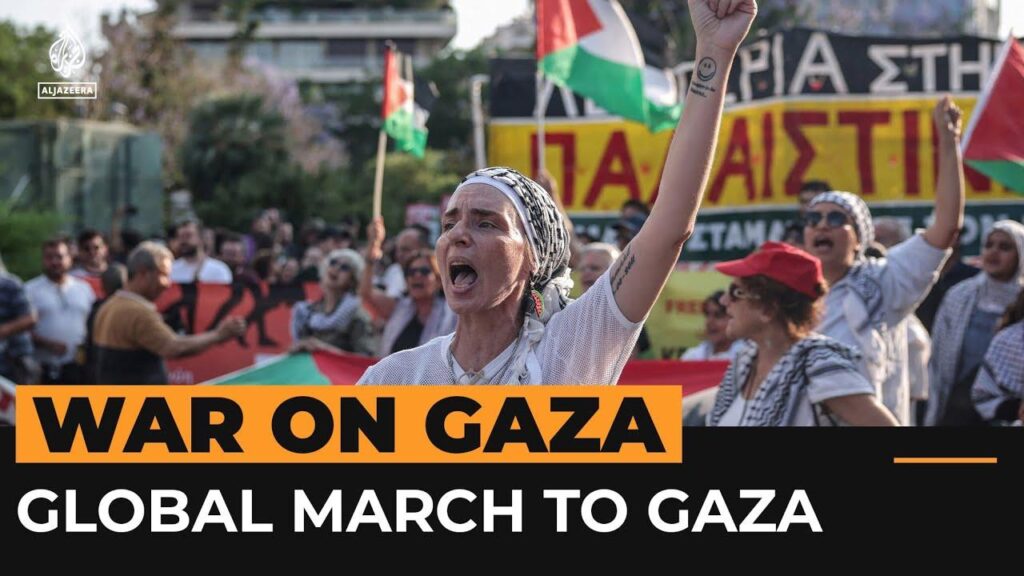Detention and Alleged Abuse of ‘March to Gaza’ Activists: A Closer Look at Egypt’s Response
The recent detention of activists affiliated with the “March to Gaza” movement has ignited widespread concern after multiple reports surfaced alleging mistreatment by Egyptian authorities. Known for their vocal support of Palestinian rights, members of this group reportedly endured harsh conditions and physical abuse while in custody. These developments not only underscore the fraught political environment surrounding the Israel-Palestine conflict but also spotlight ongoing challenges faced by human rights defenders in Egypt.
Reports of Mistreatment Following Arrests
Eyewitness testimonies and statements from advocacy groups reveal that individuals detained during the “March to Gaza” protests were subjected to aggressive treatment, including physical assaults. Upon release, many detainees displayed visible injuries and signs of psychological trauma, prompting urgent calls from international human rights organizations for accountability. This incident has intensified scrutiny over Egypt’s handling of political dissenters amid a climate where civil liberties are increasingly under threat.
The impact extends beyond those directly involved; families and communities connected to these activists are grappling with emotional distress caused by these events. The situation has sparked renewed debates about freedom of expression in Egypt, with critics demanding transparency from government officials regarding detention practices and treatment within prisons.
Global Reactions: Condemnation and Diplomatic Pressure
The alleged abuses against “March to Gaza” participants have drawn sharp rebuke from prominent international bodies such as Amnesty International and Human Rights Watch. These organizations emphasize a disturbing pattern wherein Egyptian authorities suppress peaceful activism through intimidation tactics that include both physical violence and psychological coercion.
This episode has galvanized diplomatic responses worldwide. Countries including Canada, Germany, and members of the European Union have publicly urged Cairo to conduct transparent investigations into these allegations. Some governments are reconsidering their foreign aid packages or diplomatic engagements as leverage aimed at encouraging reforms that respect human rights standards.[1]
A Complex Geopolitical Landscape
The intersection between geopolitical interests in the Middle East and global advocacy for human rights creates a delicate balance for international actors engaging with Egypt. While strategic partnerships remain important, there is growing pressure on governments to prioritize ethical considerations alongside security concerns when addressing issues related to civil liberties.
Toward Safer Protests: Policy Recommendations for Protecting Activists’ Rights
This troubling episode highlights an urgent need for comprehensive reforms designed to safeguard protesters’ fundamental freedoms while ensuring their safety during demonstrations:
- Enhanced Law Enforcement Training: Equip police forces with specialized instruction on non-violent crowd management techniques aligned with international human rights norms.
- CLEAR USE-OF-FORCE PROTOCOLS: Establish explicit guidelines delineating acceptable actions during public gatherings, minimizing excessive force incidents.
- AUTONOMOUS OVERSIGHT MECHANISMS: Create independent bodies empowered to investigate complaints against security personnel impartially.
- DUE PROCESS GUARANTEES FOR DETAINEES: Ensure immediate access to legal counsel upon arrest along with protections against arbitrary detention or mistreatment.
| Pillar of Reform | Aimed Result |
|---|---|
| Civil Liberties Legislation Enhancement | Diminished instances of unlawful arrests |
| Civic Education Initiatives | Elevated public awareness regarding protester rights |
| Sustained Accountability Reviews | Sustained improvements in law enforcement conduct |
An open dialogue between government representatives, civil society leaders, and community stakeholders is essential for fostering mutual understanding around contentious issues related to activism. Encouraging peaceful assembly through clear legal frameworks will help rebuild trust among citizens wary about expressing dissent freely.[2]
Navigating Forward: Implications Amid Ongoing Regional Tensions and Human Rights Advocacy
The reported assault on “March to Gaza” activists following their arrest serves as a stark reminder about persistent obstacles confronting advocates championing Palestinian causes within volatile regional contexts. As global attention intensifies around Egypt’s approach toward managing opposition voices, demands grow louder calling not only for justice concerning this specific case but also systemic changes protecting freedom of speech across North Africa.[3]
The unfolding situation remains under close observation by media outlets worldwide alongside watchdog groups dedicated toward monitoring violations linked directly or indirectly with Israel-Palestine tensions.
Continued vigilance will be critical moving forward — both domestically within Egypt’s borders as well as internationally — if meaningful progress toward respecting democratic principles is ever going be realized amidst complex geopolitical realities.
